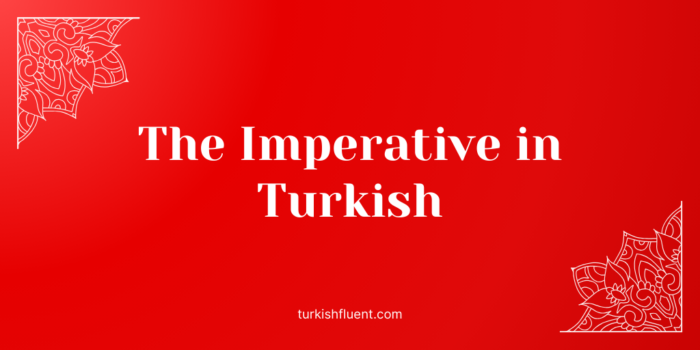In this article, you will discover how to use the imperative in Turkish effectively, including its affirmative, negative, and question forms. A useful mood to know to give order and instructions in Turkish!
The imperative mood in Turkish, known as Emir Kipi, is used to give commands, requests, instructions, or suggestions, just like in English. Imperatives are direct and cannot be used with the pronouns “ben” (I) and “biz” (we), as one cannot give commands to oneself.
Common Scenarios:
- Commands: Camı aç! (Open the window!)
- Requests: Lütfen yardım et! (Please help!)
- Directions: Sağa dön! (Turn right!)
- Recipes: Domates ve biberleri doğra! (Chop the tomatoes and the peppers!)
How to Form the Imperative in Turkish
Affirmative Form
verb root + imperative suffix
| Pronoun | Imperative Suffix | Example |
|---|---|---|
| Sen | — | gel, bekle |
| O | -sın, -sin, -sun, -sün | gelsin, beklesin |
| Siz | -in, -ın, -un, -ün | gelin, bekleyin |
| Onlar | -sın(lar), -sin(ler), -sun(lar), -sün(ler) | gelsinler, beklesinler |
Note: we use the suffix “-iniz” with Siz only for formal instructions or signs. For example:
- Lütfen sigara içmeyiniz! (Please do not smoke!)
- Çimlere basmayınız! (Do not step on the grass!)
Examples:
- Defteri buraya getir! (Bring the notebook here!)
- Eve erken gel! (Come home early!)
- Arabanı dikkatli kullan! (Drive your car carefully!)
Negative Form
verb root + ma/me + imperative suffix
| Pronoun | Negative Ending | Example |
| Sen | -ma, -me | gelme, bekleme |
| O | -masın, -mesin | gelmesin, beklemesin |
| Siz | -mayın, -meyin | gelmeyin, beklemeyin |
| Onlar | -masın(lar), -mesin(ler) | gelmesinler, beklemesinler |
Examples:
- Beni bir daha arama. (Don’t call me again.)
- Söyle ona salonda yatmasın. (Tell him/her not to sleep in the living room.)
- Lütfen ağlamayın. (Please don’t cry.)
- Boşuna otobüsü beklemesinler. (Tell them not to wait for the bus for no reason.)
Question Form
positive/negative imparative form + question ending
| Pronoun | Positive Question Ending | Negative Question Ending |
| Sen | — | — |
| O | -sın mı?, -sin mi?, -sun mu?, -sün mü? | -masın mı?, -mesin mi? |
| Siz | — | — |
| Onlar | -sın(lar) mı?, -sin(ler) mi?, -sun(lar) mu?, -sün(ler) mü? | -masın(lar) mı?, -mesin(ler) mi? |
Examples:
- Köftede maydanoz olsun mu? (Shall there be parsley in the meatballs?)
- Anne! Ezgi de bizimle Antalya’ya gelsin mi? (Mom! Shall Ezgi come with us to Antalya?)
- Sana yılbaşında hediye almasın mı? (Shall he/she not buy you a gift for New Year’s?)
Daily-Life Examples of Imperative Use in Turkish
Here are 10 sentences demonstrating the usage of the imperative mood in real-life situation:
- Kitabı masaya koy! (Put the book on the table!)
- Dışarı çık ve beni bekle! (Go outside and wait for me!)
- Lütfen yemeği çıkarmayın! (Please don’t take the food out!)
- Telefonunu masaya bırak! (Leave your phone on the table!)
- Her şeyi unut ve biraz dinlen! (Forget everything and take some rest!)
- Lütfen sözünü kesmeyin! (Please don’t interrupt the speech!)
- Yolun sonunda sola dönün! (Turn left at the end of the road!)
- Bu dosyaları hemen imzalayın! (Sign these files immediately!)
- Eğer şüphen varsa bana haber ver! (If you have doubts, let me know!)
Next read: learn how to make suggestions in Turkish with the Optative Mood.

Merhaba,
-sın, -sin eki emir kipi değil dilek istek kipidir. Fransızca’da subjonctif’e karşılık gelir. Yeni dönemde yazılmış “İstanbul” gibi kitaplarda emir kipinin altında geçse de daha ciddi kitaplara bakarsanız dilek istek kipi olduğunu göreceksiniz.
Saygılarımla.